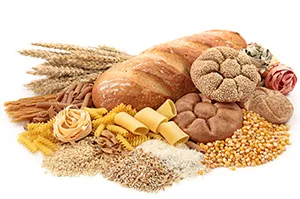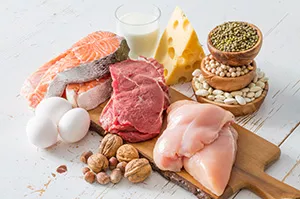In addition to staying active, diet plays a major role in the health of the vascular system. It can keep your weight, cholesterol and blood pressure in check, and can fight against the build-up of plaque in the arteries which can lead to disease. Based on the American Heart Association recommendation, an overall healthy dietary regimen includes a wide variety of fruits and vegetables, whole grains and healthy sources of protein. We asked Payam Salehi, MD, PhD, Chief of Vascular Surgery at Tufts Medical Center, to tell us more about these healthy foods.
Fruits and vegetables

Fresh, frozen, and even canned fruits and vegetables are all considered to be healthy choices (although, for canned options, be sure to read the label and watch for high contents of sodium!). Many fruits and veggies have high contents of Vitamins C and E, which help to reduce oxidative stress in the body and maintain good vascular health. Some fruits, such as blueberries, may help to lower LDL cholesterol levels as well as blood pressure. This keeps the arteries clear, which makes them a great choice for both your heart and brain. Additionally, dark, leafy greens, like spinach are rich in calcium, potassium and magnesium which are equally important components for the regulation of our blood pressure.

Whole grains
Whole grain breads, cereals, oats and even pastas are good sources of dietary fiber. Dietary fiber helps to improve blood cholesterol levels, reduce constipation, maintain bowel health, stabilize blood sugar and keeps us feeling full. Keeping cholesterol at a healthy level lowers your risk of heart disease, stroke, obesity and even type 2 diabetes. Pro tip: Choose steel cut oats or try oat bran for a high fiber, heart healthy breakfast option.
Healthy sources of protein

Fish and seafood, nuts and legumes, lean meat and poultry, and even dairy are all sources of healthy proteins. Many of these protein rich foods (think salmon, walnuts and kidney beans) also contain Omega-3 fatty acids which are pivotal in maintaining vascular and heart health due to their anti-inflammatory effect in the body. Consuming Omega-3 fats may help to reduce triglycerides, lower blood pressure, reduce blood clotting and decrease the risk of sudden cardiac death. Try to avoid processed meats, full-fat dairy products and foods with lots of added salt and sugar.